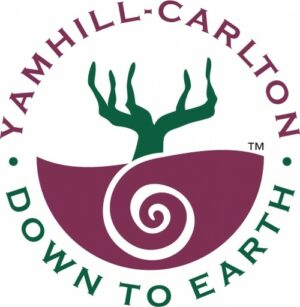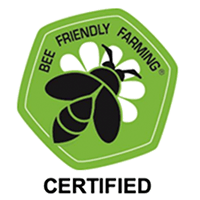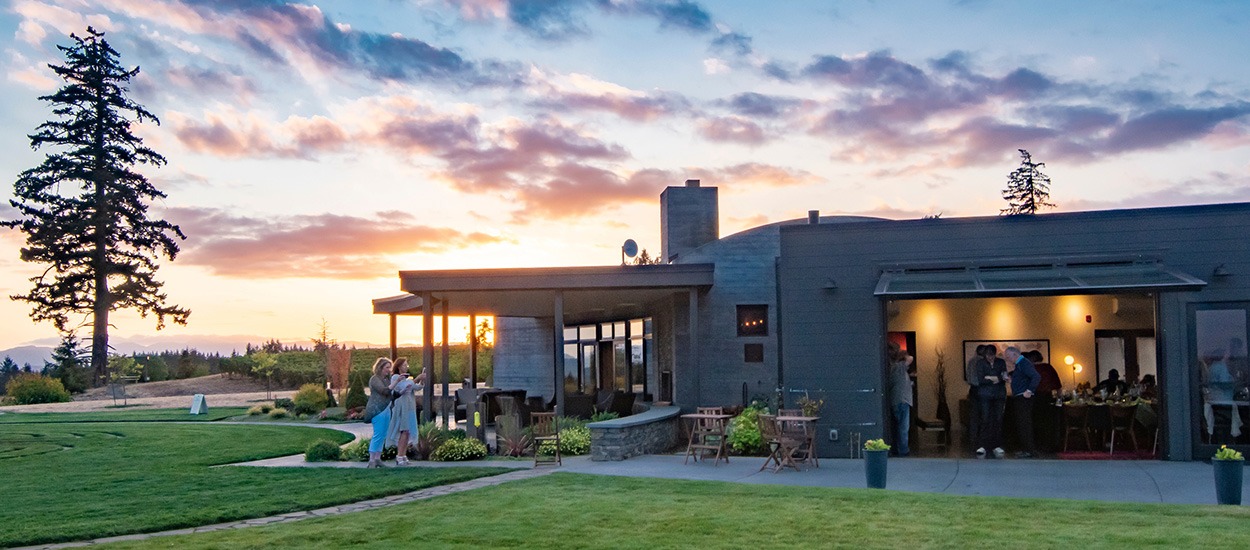ESTATE VINEYARD & FOREST
Fairsing, an Irish word that translates to bountiful, reflects our estate’s abundant resources and beauty.
Established in 2005 with the purchase of approximately two-hundred acres of harvested forestland, our grapevines and family forest honor a commitment to stewardship and conservancy.
Over forty-three acres of vines are nestled within the forest. We have reforested over seventy acres with since 18,000 conifers, 3,000 deciduous trees, and more than 6,000 native shrubs.
Fairsing, an Irish word that translates to bountiful, reflects our estate’s abundant resources and beauty.
Established in 2005 with the purchase of approximately two-hundred acres of harvested forestland, our grapevines and family forest honor a commitment to stewardship and conservancy.
Over forty-three acres of vines are nestled within the forest. We have reforested over seventy acres with since 18,000 conifers, 3,000 deciduous trees, and more than 6,000 native shrubs.
VARIETALS AND CULTIVARS
Fairsing is planted to 43 acres of vines – thirty-eight acres of Pinot noir and five acres Chardonnay on south-facing slopes ranging from 400 to 750 feet in elevation. Our vines thrive in a complex confluence of soils, topology, and microclimates.
Pinot noir selections include Pommard, Wadenswil, and Dijon 114, 115, 667, and 777.
Chardonnay selections include Dijon 76, 95, and Entav 548 varieties.
Select scions are grafted to riparia gloire, 101-14, and 3309 rootstocks. Vines are tightly spaced at 1.0 meters by 1.8 meters, averaging 2240 vines per acre.
Our first eighteen acres were planted to vine in 2006, with further development adding approximately five acres of production per year from 2007 through 2010. In recent years a few select acres have been planted to Chardonnay and Pinot noir.
Fairsing is planted to 43 acres of vines – thirty-eight acres of Pinot noir and five acres Chardonnay on south-facing slopes ranging from 400 to 750 feet in elevation. Our vines thrive in a complex confluence of soils, topology, and microclimates.
Pinot noir selections include Pommard, Wadenswil, and Dijon 114, 115, 667, and 777.
Chardonnay selections include Dijon 76, 95, and Entav 548 varieties.
Select scions are grafted to riparia gloire, 101-14, and 3309 rootstocks. Vines are tightly spaced at 1.0 meters by 1.8 meters, averaging 2240 vines per acre.
Our first eighteen acres were planted to vine in 2006, with further development adding approximately five acres of production per year from 2007 through 2010. In recent years a few select acres have been planted to Chardonnay and Pinot noir.
SOILS
The foundation of the vineyard is ancient marine-sediment parent rock that has created moderately deep silty-clay loam soils.
Predominate soils include the Windy Gap and Bellpine series with the Goodin and Dupee series also prevalent.
The efficient water drainage of these soils triggers an initiation of the ripening process early in the growing season, which facilitates the development of an optimal balance of phenolics (aroma, flavor, and color), acids, and alcohol.
The silty parent rock below the soil provides a water reserve for the deep roots to sustain the vines
The foundation of the vineyard is ancient marine-sediment parent rock that has created moderately deep silty-clay loam soils.
Predominate soils include the Windy Gap and Bellpine series with the Goodin and Dupee series also prevalent.
The efficient water drainage of these soils triggers an initiation of the ripening process early in the growing season, which facilitates the development of an optimal balance of phenolics (aroma, flavor, and color), acids, and alcohol.
The silty parent rock below the soil provides a water reserve for the deep roots to sustain the vines.
CLIMATE
The estate’s climate is ideal for growing cool climate varietals like Pinot noir and Chardonnay. Temperatures generally average approximately 2.400 cumulative growing degree days over the growing season.
On most days the vineyard is warmed by northeast breezes from the Columbia Gorge. In late afternoon the predominant winds shift the southwest for access to the Pacific Ocean cooling influence provided through the Van Duzer Corridor.
Diurnal-to-nocturnal temperature difference balance the ripening process. The last few weeks before harvest the cool nights extend the hang time Pinot noir needs to fully express its flavors. These diurnal shifts slow the development of sugars, support the retention of acids, and facilitate the development of phenolics.
There is a splendid diversity of microclimates across the vineyard, which adds subtle complexity to Fairsing Vineyard wines.
Our ideal south-southeast site aspect combines with a varied topography to create unique maturation profiles. Some vine blocks rest on top of rolling ridges; others spread across smooth steep slopes; a few blocks are nestled in sloping bowls.
The vineyard is cooled on summer nights from various directions; northwest from the Pacific Coast Range, northeast from the Columbia Gorge and southwest from the Van Duzer Corridor.
The estate’s climate is ideal for growing cool climate varietals like Pinot noir and Chardonnay. Temperatures generally average approximately 2.400 cumulative growing degree days over the growing season.
On most days the vineyard is warmed by northeast breezes from the Columbia Gorge. In late afternoon the predominant winds shift the southwest for access to the Pacific Ocean cooling influence provided through the Van Duzer Corridor.
Diurnal-to-nocturnal temperature difference balance the ripening process. The last few weeks before harvest the cool nights extend the hang time Pinot noir needs to fully express its flavors. These diurnal shifts slow the development of sugars, support the retention of acids, and facilitate the development of phenolics.
There is a splendid diversity of microclimates across the vineyard, which adds subtle complexity to Fairsing Vineyard wines.
Our ideal south-southeast site aspect combines with a varied topography to create unique maturation profiles. Some vine blocks rest on top of rolling ridges; others spread across smooth steep slopes; a few blocks are nestled in sloping bowls.
The vineyard is cooled on summer nights from various directions; northwest from the Pacific Coast Range, northeast from the Columbia Gorge and southwest from the Van Duzer Corridor.
VITICULTURE
Fairsing utilizes precision viticulture practices.
Extensive shoot positioning and early season leaf pulling on the eastern side of vine canopies enhances airflow and improves sunlight exposure.
Balanced vines and open canopies are managed by maintaining or removing alleyway cover crop to regulate vigor. Crop yields are thinned to one cluster per shoot. All vines are hand-harvested.
Excellent soil water-holding capacity allows for dry farming – no irrigation. In-row cultivation is used to manage vegetation under the vine row. Tillage is minimized to protect soil structure and enhance beneficial biological agents. Compost is utilized to balance nutrients.
Fairsing utilizes precision viticulture practices.
Extensive shoot positioning and early season leaf pulling on the eastern side of vine canopies enhances airflow and improves sunlight exposure.
Balanced vines and open canopies are managed by maintaining or removing alleyway cover crop to regulate vigor. Crop yields are thinned to one cluster per shoot. All vines are hand-harvested.
Excellent soil water-holding capacity allows for dry farming – no irrigation. In-row cultivation is used to manage vegetation under the vine row. Tillage is minimized to protect soil structure and enhance beneficial biological agents. Compost is utilized to balance nutrients.
REGENERATIVE AGRICULTURE
To honor our connection with the natural world, Fairsing maintains biodiversity across the estate.
We preserve the natural habitat, protects watershed quality, and support wildlife. Fairsing also practices regenerative agriculture to nurture soil micro-biome and protect the environment. We are committed to preserving nature’s resources for generations to come.
Fairsing was certified sustainable with LIVE and Salmon Safe in 2009 and earned designation as a Certified Family Forest with the American Tree Farm System in 2013
To honor our connection with the natural world, Fairsing maintains biodiversity across the estate.
We preserve the natural habitat, protects watershed quality, and support wildlife. Fairsing also practices regenerative agriculture to nurture soil micro-biome and protect the environment. We are committed to preserving nature’s resources for generations to come.
Fairsing was certified sustainable with LIVE and Salmon Safe in 2009 and earned designation as a Certified Family Forest with the American Tree Farm System in 2013
Fairsing Vineyard is located in the Yamhill-Carlton American Viticultural Area (AVA). We are nested in the Willamette Valley AVA, which is renowned for world-class Pinot noir and Chardonnay.
We are a proud member of the Yamhill-Carlton Winegrowers Association, whose motto, “Down to Earth” reflects both the cooperative spirit of its members and the earthy quality of our wines.
Wines from the Yamhill-Carlton AVA are renowned for their abundance of spice, floral qualities, layers of dark fruit flavors and silky texture.
The AVA is distinguished by its ancient marine sedimentary silt-clay loam soils, which are well-drained and have great water-holding capacity.
Fairsing Vineyard is located in the Yamhill-Carlton American Viticultural Area (AVA). We are nested in the Willamette Valley AVA, which is renowned for world-class Pinot noir and Chardonnay.
We are a proud member of the Yamhill-Carlton Winegrowers Association, whose motto, “Down to Earth” reflects both the cooperative spirit of its members and the earthy quality of our wines.
Wines from the Yamhill-Carlton AVA are renowned for their abundance of spice, floral qualities, layers of dark fruit flavors and silky texture.
The AVA is distinguished by its ancient marine sedimentary silt-clay loam soils, which are well-drained and have great water-holding capacity.
GOOD NATURED
Fairsing’s founding principles of FAMILY, EARTH and SMILE celebrate the simple joys of life –
gathering with family and friends over a bottle of wine,
enjoying the beauty and bounty that surrounds us,
and preserving nature’s resources for generations to come.
In observing the connection between family, farming and the natural world, Fairsing is committed to sustainability, soil health, biodiversity, preservation of native habitat, watershed quality, and wildlife protection.
GOOD NATURED
Fairsing’s founding principles of FAMILY, EARTH and SMILE celebrate the simple joys of life;
gathering with family and friends over a bottle of wine,
enjoying the beauty and bounty that surrounds us,
and preserving nature’s resources for generations to come.
In observing the connection between family, farming and the natural world, Fairsing is committed to sustainability, soil health, biodiversity, watershed quality, preservation of native habitat, and wildlife protection.
CERTIFIED SUSTAINABLE
As a sustainable grower, Fairsing has held LIVE and Salmon Safe certificates since 2009 and became a Certified Family Forest with the American Tree Farm System in 2013.
In the spring of 2022, Fairsing earned certification from the Pollinator Partnership for our Bee Friendly Farming (BFF).
As a sustainable grower, Fairsing has held LIVE and Salmon Safe certificates since 2009 and became a Certified Family Forest with the American Tree Farm System in 2013.
In the spring of 2022, Fairsing earned certification from the Pollinator Partnership for our Bee Friendly Farming (BFF).
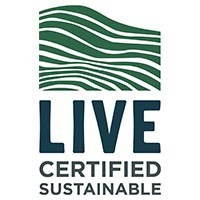
LIVE supports environmentally and socially responsible winegrowing through third-party certification and education.
With roots are in the Pacific Northwest, LIVE provides research-based standard for sustainable winegrowers accredited by the International Organization for Biological Control (IOBC).
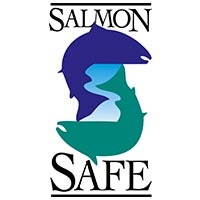
Salmon-Safe works with West Coast farmers and environmentally innovative landowners to reduce watershed impacts through verified environmental practices.
As a leading U.S. ecolabel, Salmon-Safe offers peer-reviewed certification, linking land management with the protection of agricultural and urban watersheds.
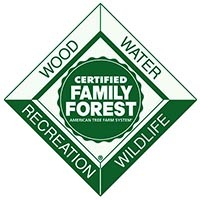
The American Tree Farm System works to give land owners the tools they need to be effective stewards of America’s forests.
Privately owned woodlands are vital to our country’s clean water and air, sustainability, wildlife habitat, and recreational activities.
Bee Friendly Farmers (BFF) work to improve the health of honey bees and support native pollinators with increased availability of flowering plants.
The Pollinator Partnership is a non-profit 501(c)3 organization — the largest in the world dedicated exclusively to the protection and promotion of pollinators and their ecosystems.
SUSTAINABLE INITIATIVES
SUSTAINABLE CELEBRATION
Fairsing observed its 15th Anniversary with gratitude and sustainability
To celebrate the land now called Fairsing, we acknowledge the original land stewards who sculpted this terrain by honoring them with continued and mindful preservation of the landscape.
Throughout 2021 we initiated and enhanced a number of sustainable measures including:
• planting of numerous conifers and deciduous trees to our forest understory
• expanding our apiary to accommodate a growing honeybee population
• enhancing our holistic farming with fortified compost, and more…
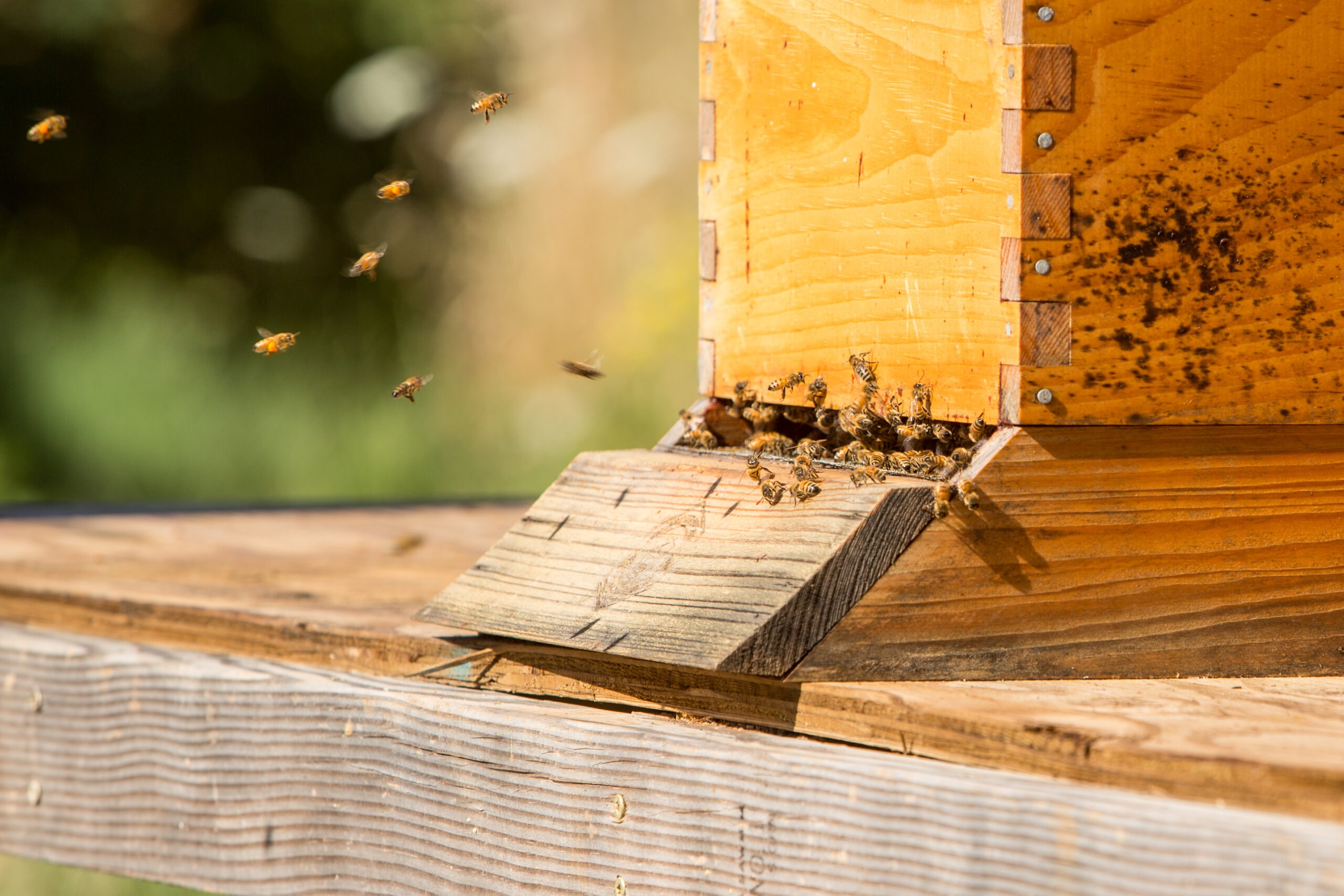
CELEBRATING 15 YEARS
Fairsing marks its 15th Anniversary with gratitude and sustainability
To celebrate the land we now call Fairsing, we acknowledge the original land stewards who sculpted this terrain and honor them with a continued and mindful preservation of the landscape.
Throughout 2021 we observed our anniversary by initiating and enhancing a number of sustainable measures including:
• planting of numerous conifers and deciduous trees to our forest understory
• expanding our apiary to accommodate a growing honeybee population
• enhancing our holistic farming with fortified compost, and more…
THE ORIGINAL LAND STEWARDS
This land was once a carefully designed and engineered ecosystem due to the stewardship of the Kalapuya Tribal peoples and other bands of the Columbia and Willamette river regions.
Over a span of 3,500 years, the Willamette Valley evolved from a heavily forested landscape to a bountiful mosaic of meadows, oak savannah, grasslands, and healthy forest under the systematic care of Tribal peoples.
As the Willamette Valley wine community celebrates well-deserved Protected Geographical Indication (PGI) status, its imperative to acknowledge the region’s original land stewards who preserved the area’s magnificent terroir.
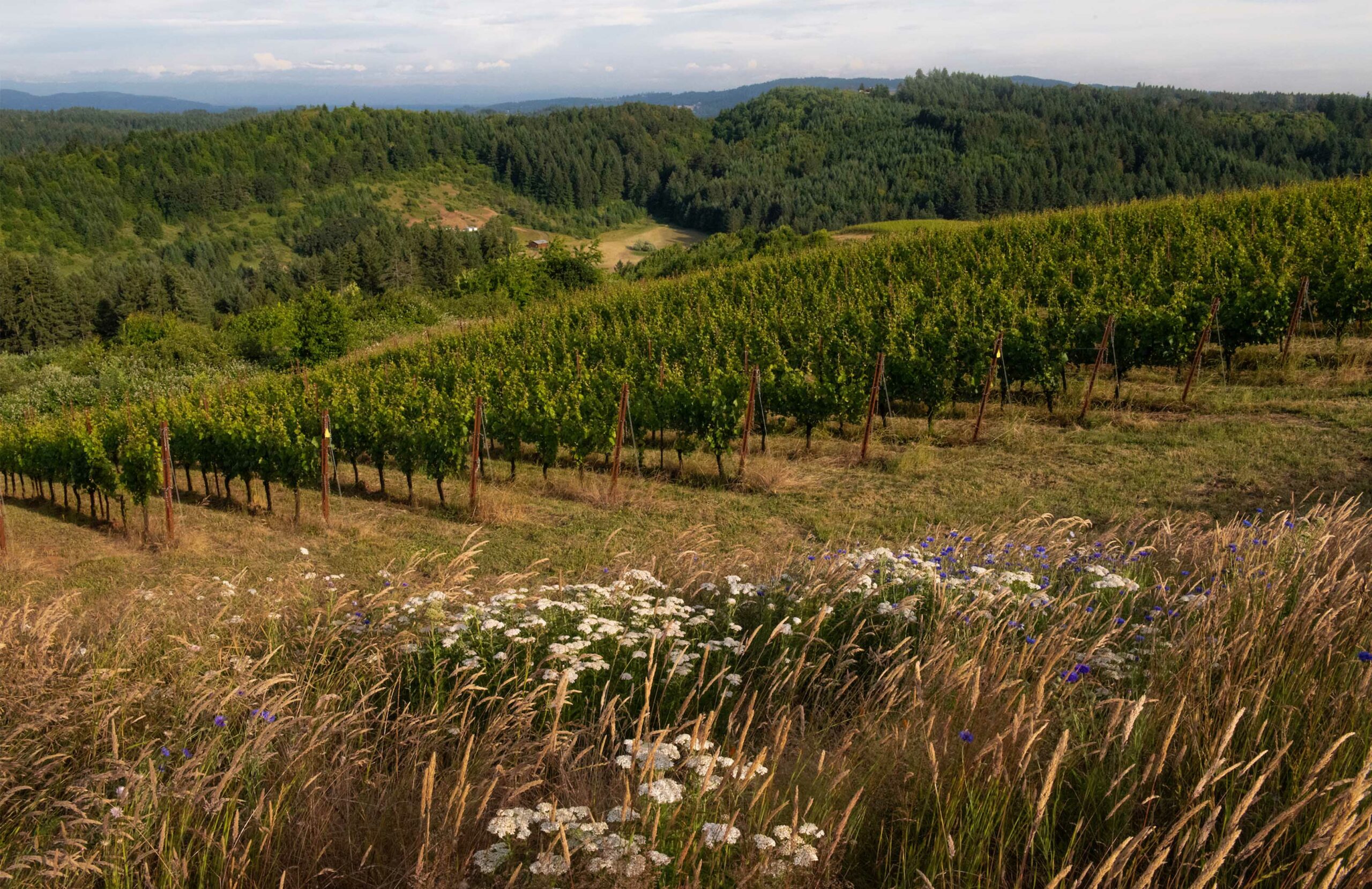
ORIGINAL STEWARDS
This land was once a carefully designed and engineered ecosystem due to the stewardship of the Kalapuya Tribal peoples and other bands of the Columbia and Willamette rivers.
Over a span of 3,500 years, the Willamette Valley evolved from a heavily forested landscape to a mosaic of meadows, oak savannah, grasslands, and healthy forest under the systematic care of Tribal peoples.
As the Willamette Valley wine community celebrates well-deserved Protected Geographical Indication (PGI) status, its imperative to acknowledge the region’s original land stewards who preserved the area’s magnificent terror.
FIBER FLAX – FROM SEED TO HARVEST
In March of 2021 Fairsing welcomed its first plot of fiber flax
Renowned for its durable and light weight textiles, fiber flax is one of the most sustainable natural fibers in the world
Flax requires little water over its fast 100 day growth cycle and, as it grows, converts CO2 from the atmosphere.
Follow as Fairsing extracts fiber from the dried harvested stems and learns to process flax.
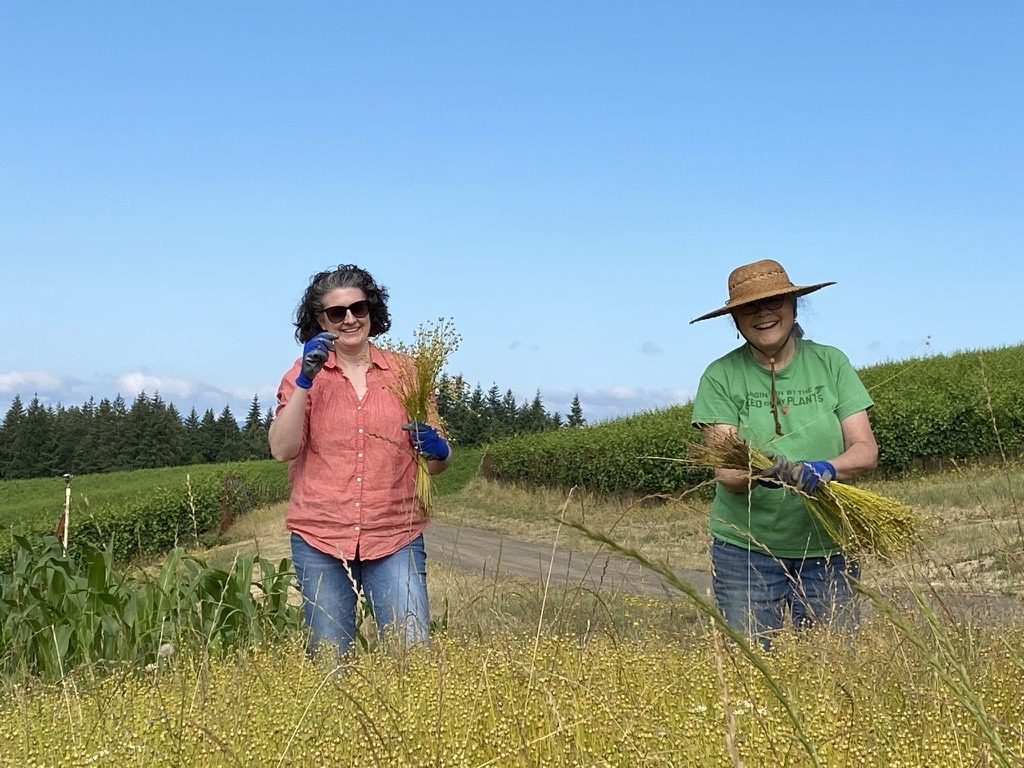
FIBER FLAX – FROM SEED TO HARVEST
In March of 2021 Fairsing welcomed its first plot of fiber flax
Renowned for its durable and light weight textiles, fiber flax is one of the most sustainable natural fibers in the world
Flax requires little water over its fast 100 day growth cycle and, as it grows, converts CO2 from the atmosphere.
Follow as Fairsing extracts fiber from the dried harvested stems and learns to process flax.
HOLISTIC FARMING and COMPOST
Shovel after shovel, we’re enriching Fairsing Vineyard with a super-charged formulated compost
Fairsing augments its ecosystem and soils during the growing season with a unique compost mixture
From red wiggler earthworms, to oak bark, straw, and yarrow – nutrient-rich organic matter piles up at Fairsing
Each year, select areas of the vineyard and family forest are identified and fortified with the dense compost
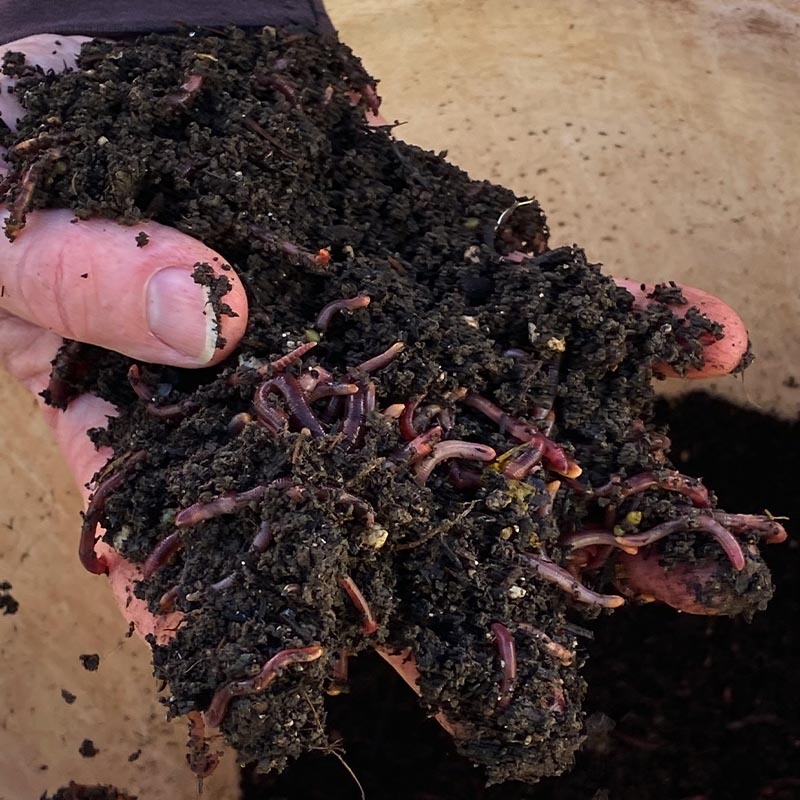
HOLISTIC FARMING and COMPOST
Shovel after shovel, we’re enriching Fairsing Vineyard with a super-charged formulated compost
Fairsing augments its ecosystem and soils during the growing season with a unique compost mixture
From red wiggler earthworms, to oak bark, straw, and yarrow – nutrient-rich organic matter piles up at Fairsing
Each year, select areas of the vineyard and family forest are identified and fortified with the dense compost
OAK ACCORD PROGRESS AT FAIRSING
Led by the Willamette Partnership, the Oak Accord is a voluntary conservation agreement by landowners to protect and restore native oak habitat
As a founding member, Fairsing has been active in preserving and enhancing oak habitat across the estate
Following a baseline assessment by an ecologist, Fairsing has been busy nurturing mature oaks, saplings, and seedlings
In February of 2021, over 1,000 bare-root oak saplings were planted among oak trees of varied maturity to complement our existing ecosystem
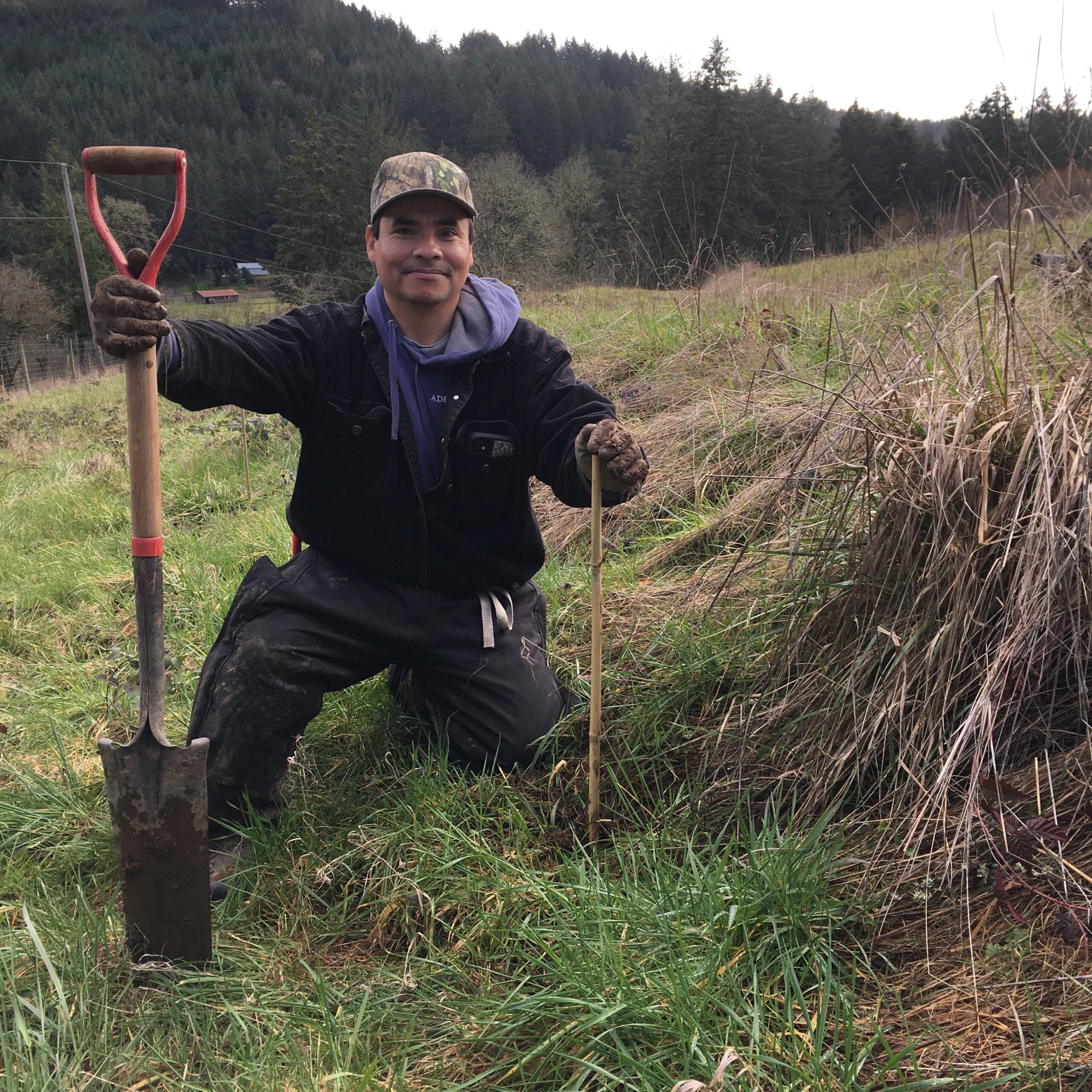
OAK ACCORD PROGRESS AT FAIRSING
Led by the Willamette Partnership, the Oak Accord is a voluntary conservation agreement by landowners to protect and restore native oak habitat
As a founding member, Fairsing has been active in preserving and enhancing oak habitat across the estate
Following a baseline assessment by an ecologist, Fairsing has been busy nurturing mature oaks, saplings, and seedlings
In February of 2021, over 1,000 bare-root oak saplings were planted among oak trees of varied maturity to complement our existing ecosystem

CRIMSON CLOVER & FAIRSING
Each spring the Willamette Valley rolls out a red carpet of beautiful crimson clover to welcome visitors.
Revered across cultures for its highly nutritive properties as a ground cover, crimson clover earned distinction as one of the earliest cultivated economic plants.
Crimson clover grows quickly, attracts pollinators, replenishes the soil, and blankets our estate with vibrant blooms.
Before the 2021 fall rains arrived, crimson clover was among 750 pounds of legumes, oats, and barley seed planted between the vine rows and headlands to prevent soil erosion and add biomass.
For its genuine beauty, restorative value, and Celtic symbolism, Fairsing selected illustrations of both crimson and white clover (the shamrock) to grace our wine bottle labels.
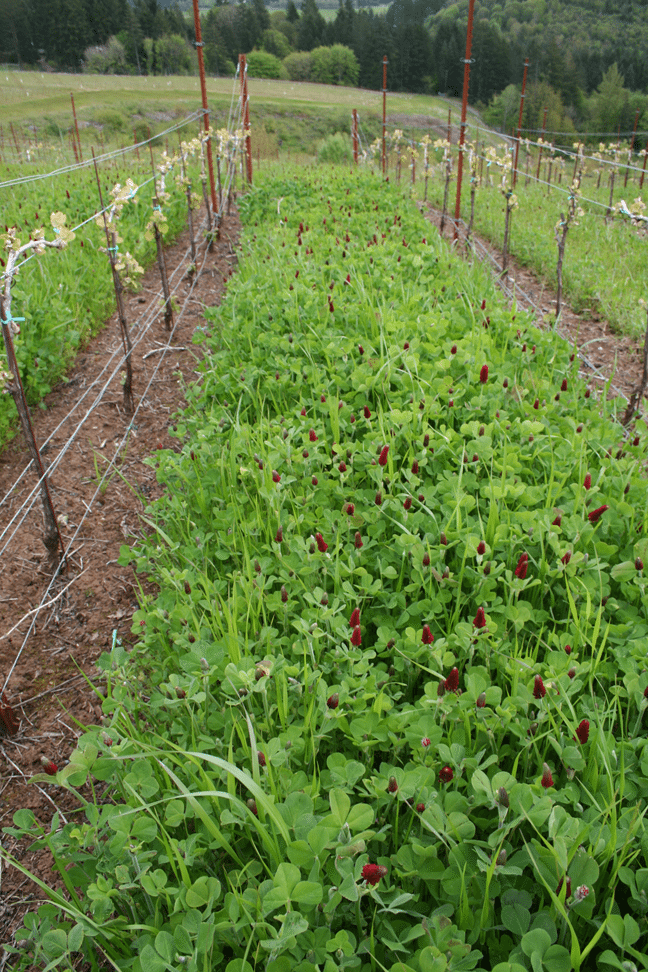
CRIMSON CLOVER & FAIRSING
Each spring the Willamette Valley rolls out a red carpet of beautiful crimson clover to welcome visitors.
Revered across cultures for its highly nutritive properties as a ground cover, crimson clover earned distinction as one of the earliest cultivated economic plants.
Crimson clover grows quickly, attracts pollinators, replenishes the soil, and blankets our estate with vibrant blooms.
Before the 2021 fall rains arrived, crimson clover was among 750 pounds of legumes, oats, and barley seed planted between the vine rows and headlands to prevent soil erosion and add biomass.
For its genuine beauty, restorative value, and Celtic symbolism, Fairsing selected illustrations of both crimson and white clover (the shamrock) to grace our wine bottle labels.
FAIRSING CERTIFIED AS FAMILY FOREST
In 2013 Fairsing Vineyard became a Certified Family Forest with the American Tree Farm System
Certification includes compliance and meeting standards of ecological and economic sustainable forest management.
When purchased, all but 30 acres of Fairsing’s 170-acre site was a clear-cut forest with nearly 90 acres suitable for vineyard development.
With a commitment to sustainability and preservation, it was decided to return 80 acres of the site to its natural habitat as a forest.
Since 2007, over 18,000 conifers, 3,000 deciduous trees,, and 6,000 shrubs have been planted and nurtured across the estate.
In February of 2021, we expanded upon our commitment and planted a variety of new trees including Japanese maple and incense cedar. With time these saplings will compliment our existing ecosystem infrastructure and enhance our forest understory.
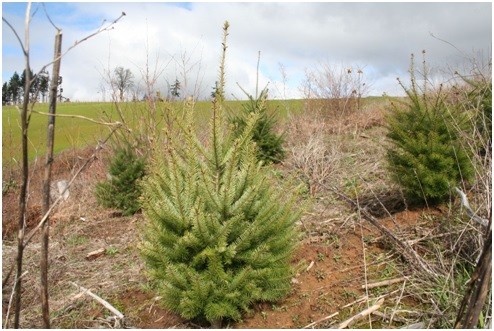
FAIRSING CERTIFIED AS FAMILY FOREST
In 2013 Fairsing Vineyard became a Certified Family Forest with the American Tree Farm System
Certification includes compliance and meeting standards of ecological and economic sustainable forest management.
When purchased, all but 30 acres of Fairsing’s 170-acre site was a clear-cut forest with nearly 90 acres suitable for vineyard development.
With a commitment to sustainability and preservation, it was decided to return 80 acres of the site to its natural habitat as a forest.
Since 2007, over 18,000 conifers, 3,000 deciduous trees,, and 6,000 shrubs have been planted and nurtured across the estate.
In February of 2021, we expanded upon our commitment and planted a variety of new trees including Japanese maple and incense cedar. With time these saplings will compliment our existing ecosystem infrastructure and enhance our forest understory.
“… stop by the peaceful Fairsing Vineyard for beautiful wines and infinite views of the surrounding Willamette Valley and peaks from the Cascades to the Coastal Mountain Ranges.”
– LAT + LONG, The Rand McNally Travel Blog

